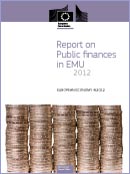|
|
|
|
|
|
|
|
|
|
 |
 |
 |
 |
Eurogroup finance ministers endorse financial assistance to recapitalise Spanish financial institutions
Euro area finance ministers (the Eurogroup) have agreed on a programme designed to help Spain recapitalise and restructure its financial institutions. Following national parliamentary procedures, the Memorandum of Understanding was endorsed by the Eurogroup on 20 July as embedded in the Council decision to be formally adopted on 23 July. The programme includes specific requirements for banks that are unable to meet their capital shortfall without public support, and for the strengthening of Spain's financial and regulatory framework. The first tranche of EUR 30bn will be activated by the end of July, in case of urgent needs in the Spanish banking sector. The exact capital shortfalls and the need for public support will be established after stress tests of the banks in question have been concluded. Financial assistance will then be provided in several tranches via the European Financial Stability Facility (EFSF) until the European Stability Mechanism (ESM) becomes operational.
|
 |
 |
 |
|
 |
 |
 |
 |
 |
|
 |
 |
 |
It is essential that the multiple challenges Spain is facing
– the repair of its banking sector, structural reforms to
boost growth and jobs and tackle imbalances, and action
to restore sustainability to its public finances – are addressed
with equally strong determination.
Olli Rehn, European Commission Vice-President for Economic
and Monetary Affairs and the Euro |
 |
|
|
|
 |
 |
 |
 |
Troika concludes Irish economic programme is
on track
Staff teams from the European Commission (EC),
European Central Bank (ECB), and International Monetary
Fund (IMF), the “Troika”, visited Dublin during
3-12 July for the seventh review of the government’s
economic programme. They concluded that Ireland’s
policy implementation remains on track despite challenging
macroeconomic conditions. In line with the conclusions
of the euro area summit statement of 29 June, the
staff teams are discussing with the Irish authorities
possible technical solutions to further improve
the sustainability of the country’s well-performing
adjustment programme. Approval of this review by
the relevant EU bodies and the IMF Executive Board,
would make available a disbursement of EUR 0.9 billion
by the IMF and EUR 1.0 billion by the EU, with Member
States expected to disburse a further EUR 0.7 billion
through bilateral loans.
|
 |
|
 |
 |
|
 |
 |
 |
 |
Portugal's economic adjustment programme on track,
Commission review report finds
Following the
statement of 4 June concluding the joint fourth
quarterly review mission to Portugal of the European
Commission, the European Central Bank (ECB) and
the International Monetary Fund (IMF), the Commission
on 17 July published the fourth review report. The
report assesses compliance with the terms and conditions
of the programme and summarises the main findings
of this latest mission. The objectives of the programme
are to restore sound public finances, improve competitiveness
and put Portugal's economy back on the path of sustainable
growth and job creation. Economic activity has indeed
proven to be more resilient than projected before,
as stronger exports have more than offset weaker
domestic demand, and the target for the general
government deficit of 4.5% of GDP in 2012 remains
within reach. Despite progress made with reforms,
more determination is needed in areas touching on
sensitive political and vested interests. The conclusions
of the review allow the disbursement of EUR 4 billion
(EUR 2.6 billion by the euro area countries through
the EFSF and EUR 1.4 billion by the IMF). Overall,
the programme is supported by loans of EUR 52 billion
from the EU (EFSM/EFSF) and EUR 26 billion from
the IMF. So far, around EUR 53 billion has been
disbursed by the EU and IMF. The fifth joint review
mission is scheduled to begin on 28 August.
|
 |
|
 |
 |
|
 |
 |
 |
 |
Spain given an extra year to correct its deficit
European finance ministers have agreed to give
Spain an extra year to correct its government deficit.
Spain has been subject to an excessive deficit procedure
since April 2009, when the Council issued a recommendation
calling for the deficit to be corrected in 2012.
Setting 2014 as the new deadline for bringing the
deficit below the EU's 3% of GDP reference value,
the recommendation issued by the Council on 10 July
establishes headline deficit targets of 6.3%, 4.5%
and 2.8% of GDP for the years 2012, 2013 and 2014.
In reaching their decision, the leaders took into
account the adverse economic circumstances affecting
Spain, including lower than expected growth rates
and a higher than expected government deficit. The
Council called on Spain to show its commitment to
consolidation by adopting its announced budget plan
for 2013 and 2014 by the end of July 2012, and set
a three-month deadline for Spain to take effective
action.
|
 |
|
 |
 |
|
 |
 |
 |
 |
Council approves project bond pilot phase
At their meeting on 10 July, European finance
ministers adopted a regulation launching the 2012-2013
pilot phase of the EU project bond initiative. The
initiative aims to mobilise up to EUR 4.5 billion
in private sector financing for key strategic EU
infrastructure projects. Adoption of the regulation
follows an agreement reached with the European Parliament
on 22 May. Project bonds are private debt issued
by the sponsor(s) of a project, either a private
company or a special purpose vehicle (SPV) created
by one or more companies to finance a specific project.
The EU project bond instrument will provide credit
enhancement for projects to make it easier for their
sponsors to attract private financing. If successful,
the pilot phase will be followed by an operational
phase during 2014-2020 under the EU's “Connecting
Europe” facility for transport, energy and ICT projects.
|
 |
|
 |
 |
|
 |
 |
 |
 |
Commission publishes “Quarterly report on the
euro area”
Against the background of weaker economic activity
across the globe, the July edition of the Quarterly
Report examines recent trade developments at the
global, euro area, and euro area Member State level
in detail. In particular, in addressing the question
of whether the crisis had left a lasting mark on
global trade, it concludes that overall, global
trade seems to be approaching its long-term growth
trend, partly thanks to strong export demand from
emerging market economies, but that global trade
will probably expand at lower rates than in the
boom years of the previous decade. The report also
reviews the euro area's trade performance, and takes
a closer look at selected drivers of trade performance
at the euro area Member State level.
|
 |
|
 |
 |
|
 |
 |
 |
 |
Barroso lays out priorities for Cypriot EU presidency
“Status quo is not an option,” said Commission
President Manuel Barroso in launching the Cypriot
Presidency of the EU. Speaking at a press conference
on 6 July in Nicosia, Cyprus, President Barroso
laid out a series of fundamental issues on which
“we have to make progress quickly.” The centrepiece
of the Presidency, according to Barroso, will be
to make progress on the Commission's proposals for
a banking union that includes proper supervision
of European banks, protection for citizens’ bank
deposits and a framework for dealing with banks
in trouble. He also mentioned the need to continue
efforts to strengthen economic and budgetary surveillance,
implement measures related to bank capital requirements
and credit rating agencies, and garner support for
the Financial Transaction Tax and the Multi-annual
Financial Framework, the EU’s budget for the next
seven years as of 2014.
|
 |
|
 |
 |
|
 |
 |
 |
 |
Protecting taxpayers' money: Commission proposes
to strengthen use of criminal law against fraudsters
The European Commission has proposed new rules
to fight fraud against the EU budget by means of
criminal law. The new Directive, which was proposed
on 11 July, aims to better safeguard taxpayers’
money. It creates a more harmonised framework, including
common definitions and minimum sanctions, for prosecuting
and punishing crimes involving the EU budget so
that criminals can no longer exploit differences
between national legal systems. Since 2000, 281
out of a total of 647 cases transferred by the European
Anti-Fraud Office (OLAF) to national judicial authorities
were dismissed. Conviction rates for these cases
range from 14% to 80% across Member States, with
an EU average of 41%. The differences are largely
due to a patchy legal framework.
|
 |
|
 |
 |
|
 |
 |
 |
 |
Commission and Latvia sign Partnership Agreement
on euro changeover communication activities
On 10 July, the Latvian Minister for Finance,
Andris Vilks, and the European Commission Vice-President
responsible for Economic and Monetary Affairs and
the euro, Olli Rehn, signed a Partnership Agreement
on euro changeover communication activities. The
Commission and the Latvian government agreed to
coordinate their information and communication efforts
in Latvia in order to increase public knowledge
of Economic and Monetary Union and the euro, and
to contribute to a smooth euro changeover in Latvia
without prejudice to relevant future Council decisions.
The agreement also allows the Commission to support
a series of communication activities laid down in
the "Communication Strategy for the Euro Changeover
in Latvia". The Commission entered into similar
Partnership Agreements in the past with other Member
States planning to adopt the euro.
|
 |
|
 |
 |
|
|
|
 |
 |
 |
 |
Public Finances in EMU 2012
The European Commission published its 2012 Report
on Public finances in EMU on July 18. The report
examines the state of play as far as the sustainability
of Member State debt is concerned. Twenty-one Member
States remain subject to the Excessive Deficit Procedure,
and budget balances within the euro area vary widely.
The Commission underlines, however, that despite
the worsened economic outlook Member States continue
to reduce deficits. Recent developments in budgetary
surveillance - such as the 'Six Pack' of legislation
- constitute solid foundations for future discipline,
though concerns remain over issues such as the devolution
of expenditure and revenue tasks from central to
sub-national tiers of government. Taken together,
measures now in implementation are designed to lead
to a genuine economic and monetary union. Reform
of economic governance will at the same time not
be sufficient to solve the current crisis, which
will require de-leveraging in both the public and
the private sector.
|
|
 |
 |
|
|
|
|
|
|
|
|
|
|
|
|
|
|
|
 |
|
Directorate-General for Economic and Financial Affairs
|
 |
|